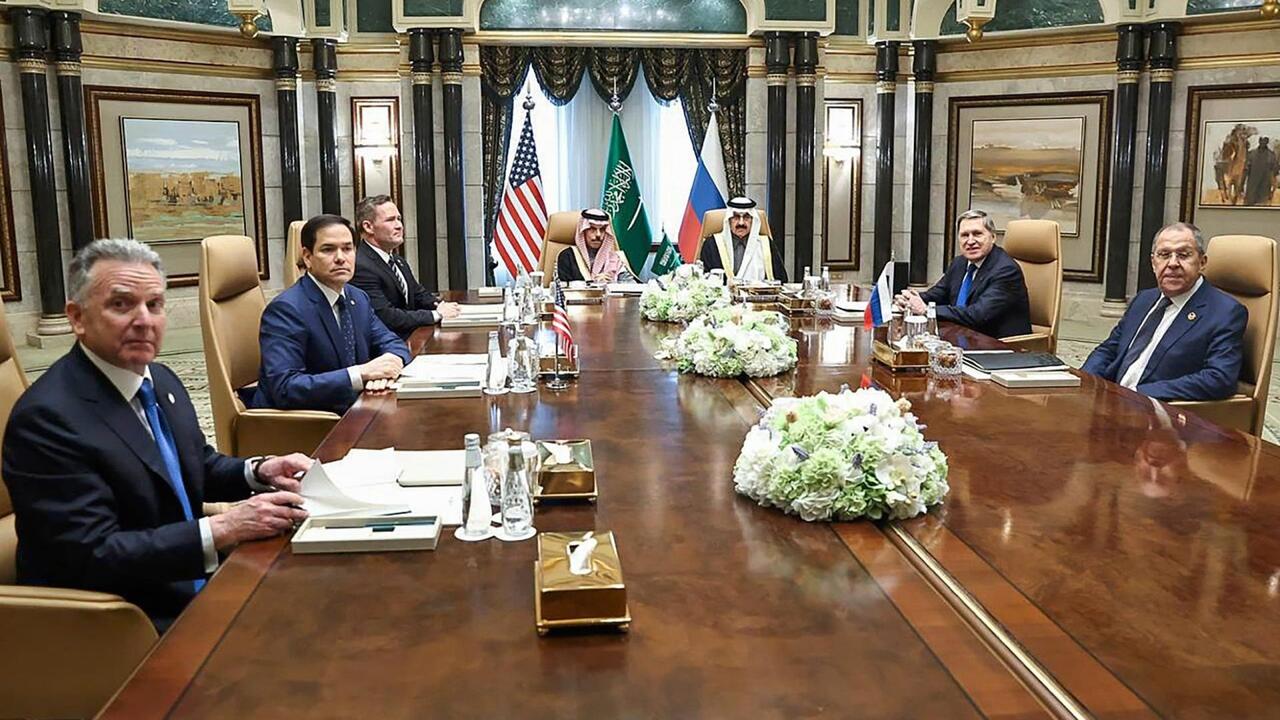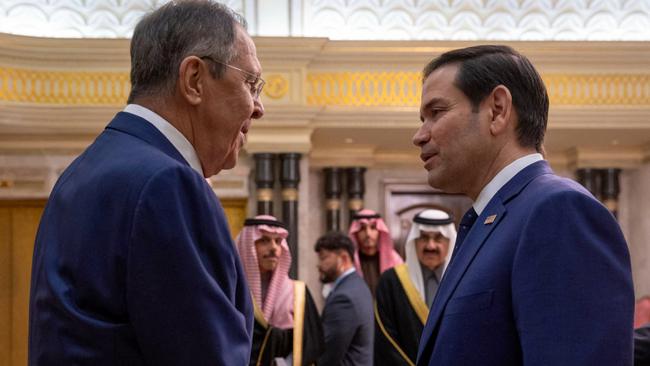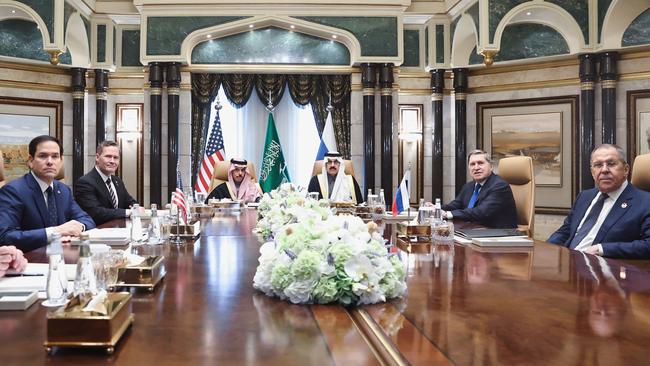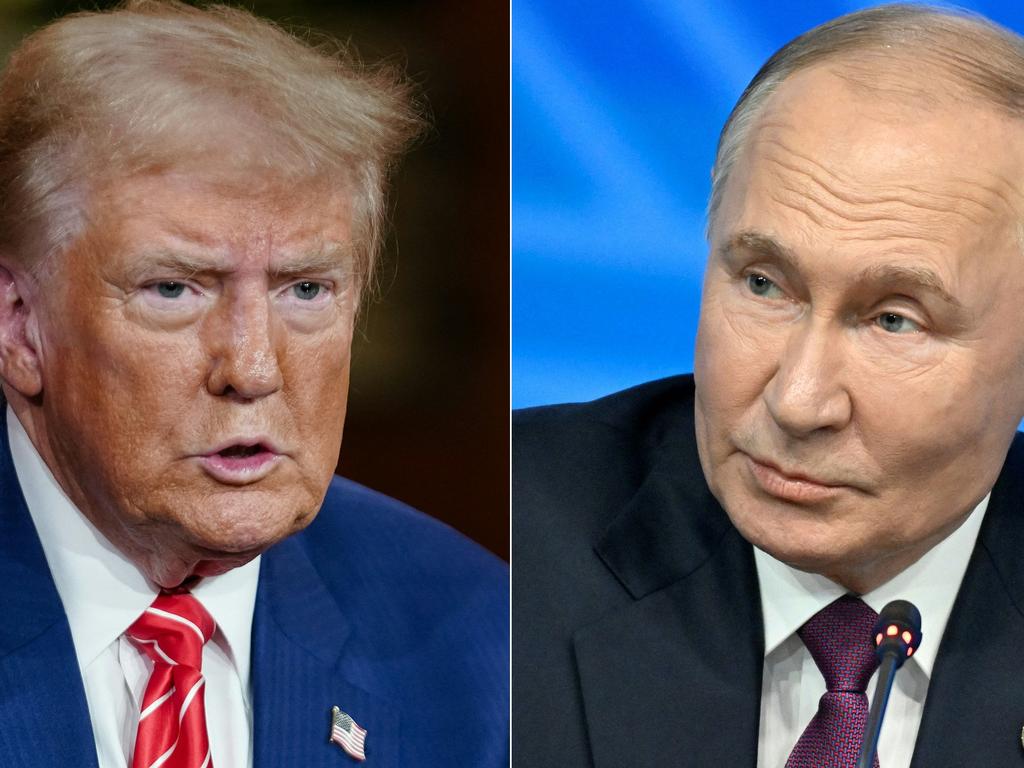US, Russia announce fresh initiatives after high-level talks
The US and Russia will appoint high-level teams to work together to end the conflict in Ukraine but their initiatives raise fresh questions about the broader process for halting the war.

The US and Russia have agreed to appoint high-level teams who would work together to try to end the conflict in Ukraine, marking an end to three years of US policy that focused on isolating Moscow and supporting Kyiv for as long as it was willing to keep fighting.
The announcement of a formal process to try to halt the war followed a day of top-level talks between Washington and Moscow aimed at resetting Washington’s tense relationship with Moscow.
But the two sides stopped short of announcing a summit meeting between President Trump and Russian President Vladimir Putin, which Trump had signalled he had hoped to hold soon.
“We haven’t really had much engagement with the Russians for almost three years, and it sets the table for future conversations,” Secretary of State Marco Rubio said of the Tuesday meeting. “How that turns out will be up to the parties and their willingness not just to make commitments, but to live by them. That’ll be tested in the weeks to come.”
Some of the exchanges over the Ukraine conflict in the closed-door session pointed to the difficulties that would need to be overcome to halt a war that has already led to more than a million casualties.
Sergei Lavrov, Russia’s foreign minister, said after the meeting the US had raised the possibility of establishing a moratorium on Russian and Ukrainian strikes against each other’s energy infrastructure.
Lavrov said he had told the Americans that Russia doesn’t target power sources that serve the Ukrainian population, a contention that US officials and outside experts have long dismissed.
He said it was “unacceptable” for any foreign troops to conduct peacekeeping missions in Ukraine after the war concludes.
“The presence of troops from NATO countries, whether under foreign flags, EU flags, or their own national flags, does not change anything. This is, of course, unacceptable to us,” Mr Lavrov said.
Still, US and Russian delegations agreed that the two sides should restore staffing levels at their embassies, which have been reduced since Russia’s full-scale invasion of Ukraine three years ago. They will also identify ways of cooperating economically and on foreign-policy issues if the war winds down and relations improve.

The talks, held at the Saudi capital’s ornate Diriyah Palace, were the highest-profile meeting between US and Russian officials since the Ukraine war began.
The US side was represented by Rubio, national security adviser Mike Waltz and Steve Witkoff, Trump’s Middle East envoy.
Russia was represented by Yuri Ushakov, a close adviser to Putin who was the Russian ambassador in Washington, and Lavrov, who has been foreign minister for more than 20 years.
Trump administration officials said their accelerated diplomacy, which began with a phone call Trump held with Putin last week, reflected the American president’s penchant for action.
“As we’ve already seen with President Trump and this administration, things that maybe normally would take six months or a year or two years are taking a matter of weeks,” State Department spokeswoman Tammy Bruce told reporters Monday.
But the Trump administration’s rush to engage Russia has unnerved European leaders by dispensing with the sort of advance consultations about US policies toward Moscow that have long been a staple of the Western alliance.
“What Trump and the administration should have done is work out details with Ukraine and the Europeans on how to advance peace and then talk to the Russians,” said Ivo Daalder, who was US ambassador to the North Atlantic Treaty Organisation during the Obama administration.
The talks here have been seen by some in Europe as another indication that decades of Western foreign policy are undergoing a tectonic shift. Trans-Atlantic ties, already battered by Vice President JD Vance’s scathing speech that accused European leaders of ignoring the will of their voters, have been strained further as allies confronted the fact that the Riyadh meeting would take place without their participation or that of Ukraine.
Trump administration officials have sought to assuage allies’ concerns by casting Tuesday’s talks as a chance to explore Russia’s intentions, rather than the start of detailed negotiations over Ukraine’s future.
Before leaving for Riyadh, Lavrov said there could be “no thought” of making territorial concessions to Ukraine and there would be no need for European nations to assume a role in future negotiations over the Ukraine conflict.

Also unclear is the process by which the US hopes to foster a settlement of the conflict in Ukraine. Waltz and Rubio described an approach in which a newly formed US team would regularly meet with its Russian counterparts and consult with Ukraine and European allies about important issues.
“No one is being sidelined here,” Rubio told reporters.
But Keith Kellogg, the retired Army lieutenant general serving as the Trump administration’s special envoy for Ukraine, sketched out a somewhat different process on Saturday when he sought to reassure the Ukrainians they could eventually have a place at the table in any talks with Russia.
That has left open the possibility that the two approaches might be pursued in parallel or even combined at some point.
Speaking in Ankara, Ukrainian President Volodymyr Zelensky said that no other country could decide how to end the war in Ukraine without Ukraine. “I, like no one else, want the end of the war,” he told reporters after meeting with Turkish President Recep Tayyip Erdogan. “But we want it to be just and that no one should decide anything behind our backs. I think that’s fair.” Zelensky said that the US-Russian meeting in Riyadh had come as a surprise and that he was postponing a separate visit he had been planning to make to Saudi Arabia. Zelensky reiterated that he didn’t believe that Putin really wanted to end the war, and that a lasting peace would require security guarantees for Ukraine from the US and European countries, possibly including troops in Ukraine from those countries.
Though American officials have said European representatives would be consulted, the Trump administration doesn’t envision that they would be equal negotiating partners in future Ukraine talks.
In explaining that negotiating structure, Kellogg said a new approach was needed because a decade-old agreement that involved European powers, but not the US, had failed to produce a sustainable peace.
Kellogg was referring to the 2015 Minsk-2 accord, negotiated by Germany and France with Ukraine and Russia. “There were a lot of people at the table, but it didn’t work out,” Kellogg said Saturday at a security conference in Europe.
Now the pendulum has swung to a new approach in which the US, but not European allies, are to lead the negotiating effort.
Daniel Fried, a former US ambassador to Poland who is now at the Atlantic Council think tank, said the diplomatic process Trump has begun could prove useful if the White House doesn’t allow its enthusiasm for boosting ties with Putin to override its willingness to stand up for Ukraine’s interests.
Britain and Sweden have suggested they would be willing to put their own troops on the ground to safeguard a potential peace settlement. Fried said such an approach could work if the European troops were backed up by US logistics, communications and air power, which could be called on if the European forces were in danger.
But Russia’s Foreign Ministry has already rejected the idea of stationing European peacekeeping troops in Ukraine.
“There is an argument that we shouldn’t meet with them while they’re continuing to smash the Ukrainians,” Fried said, referring to Russia’s attacks on Ukraine. “It is more important that when we do talk, we maintain the firm position to not be suckers.”
Dow Jones





To join the conversation, please log in. Don't have an account? Register
Join the conversation, you are commenting as Logout